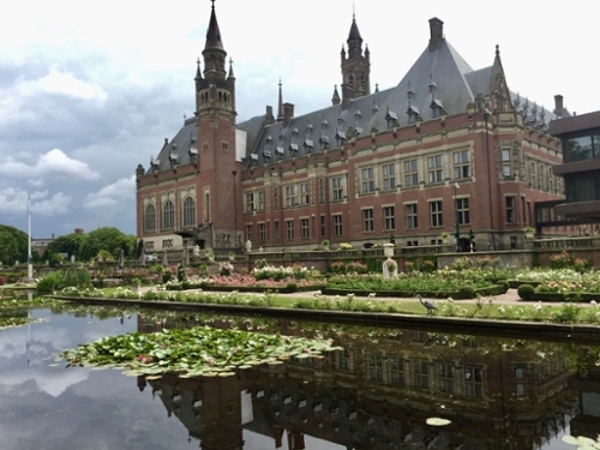The Garden of Eden
I didn't run into any nefarious snakes or enticing fruits, so Eden is a bit of an exaggeration, but the gardens at the Peace Palace are truly stunning. The Peace Palace, centrally located in the Hague, houses the International Court of Justice, the Permanent Court of Arbitration, the Hague Academy of International Law, and the Peace Palace Library, which has one of the world's largest collections of international legal materials. It lives up to its name, a massive complex of gorgeous architecture surrounded by gardens.
I ate lunch today in a far corner of the garden, with the palace just barely still in view from my bench surrounded by a vine-covered trellis, small lake, and shady trees. Near the palace, the gardens open up into flat mazes of shrubs and ponds, but paths every few feet promise more secluded, smaller gardens set away from the main buildings. While I walked through the gardens to find a spot to eat, I passed others also lunching either alone or in pairs, clearly employees or officials from their business attire and apathetic posture to the beautiful scenery. I couldn't help wondering what they did at the Peace Palace. I have been doing research in the Peace Palace library for two days, and have been itching to soak up everything I can since I first walked in the gate. The palace grounds have been at the heart of international law since it opened its gates in 1913, and as someone interested in international law, I found myself wanting to stop everyone and ask them what they did at the palace, what their expertise was, and how they came to be there.
I thought it better to leave the palace workers in peace with their lunches, however, and just walked on to my own alcove. The Eden analogy first popped into my head because over the course of my lunch, not only did I have a stunning view, but a heron, countless birds, and three bunnies, all totally unfazed by my presence, sauntered by. If the takeaway from the Garden of Eden is the fall of man, then maybe the peace palace is more accurately an inverted Eden. The topics the International Court of Justice wrestles with might reflect the depravity of man, but the Peace Palace is a beacon of light and law in the face of atrocity.
I was in the Peace Palace Library researching the international legal responsibilities of international organizations, such as International IDEA. The law regarding international organizations is still evolving, a reflection of the relatively modern increase in the international participation and power of international organizations. The scarcity of established law and somewhat amorphous nature of international law generally has made for an interesting research challenge.

Peace Palace, The Hague, Netherlands